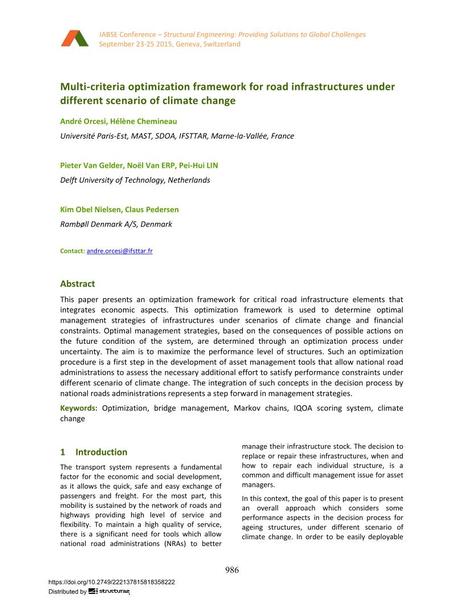Multi-criteria optimization framework for road infrastructures under different scenario of climate change

|
|
|||||||||||
Bibliografische Angaben
| Autor(en): |
Andre Orcesi
(Université Paris-Est, MAST, SDOA, IFSTTAR, Marne-la-Vallée, France)
Helene Chemineau (Université Paris-Est, MAST, SDOA, IFSTTAR, Marne-la-Vallée, France) Pieter Van Gelder (Delft University of Technology, Netherlands) Noel Van Erp (Delft University of Technology, Netherlands) Pei-Hui Lin (Delft University of Technology, Netherlands) Kim Obel Nielsen (Rambøll Denmark A/S, Denmark) Claus Pedersen (Rambøll Denmark A/S, Denmark) |
||||
|---|---|---|---|---|---|
| Medium: | Tagungsbeitrag | ||||
| Sprache(n): | Englisch | ||||
| Tagung: | IABSE Conference: Structural Engineering: Providing Solutions to Global Challenges, Geneva, Switzerland, September 2015 | ||||
| Veröffentlicht in: | IABSE Conference Geneva 2015 | ||||
|
|||||
| Seite(n): | 986-993 | ||||
| Anzahl der Seiten (im PDF): | 8 | ||||
| Jahr: | 2015 | ||||
| DOI: | 10.2749/222137815818358222 | ||||
| Abstrakt: |
This paper presents an optimization framework for critical road infrastructure elements that integrates economic aspects. This optimization framework is used to determine optimal management strategies of infrastructures under scenarios of climate change and financial constraints. Optimal management strategies, based on the consequences of possible actions on the future condition of the system, are determined through an optimization process under uncertainty. The aim is to maximize the performance level of structures. Such an optimization procedure is a first step in the development of asset management tools that allow national road administrations to assess the necessary additional effort to satisfy performance constraints under different scenario of climate change. The integration of such concepts in the decision process by national roads administrations represents a step forward in management strategies. |
||||
| Stichwörter: |
Brückenmanagement
|
||||
